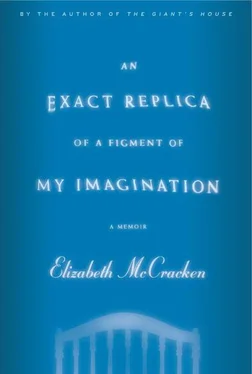“The number one question,” she explained before she left, “is ‘Will he come back?’ But you get everything. When is the next Al Qaeda attack, will I meet the love of my life next week, another psychic says he will come back, can you confirm, do you have a message from my dead grandpa.”
“What do you say?” I asked.
Her eyes were khaki green that night. “Well, sometimes you sort of get an image, and you tell them, ‘I see an old coat and a rainbow and an empty bottle.’ It’s amazing how often that’s really meaningful to someone.”
I couldn’t tell whether amazing meant she was amazed at her psychic abilities or the nature of coincidence or the ability of a desperate mind to find meaning in a random assortment of visuals. I thought about asking her if I could help out one night, though I never worked up the nerve. I liked the idea of trying to summarize someone’s best dreams in a handful of characters, a kind of augural haiku. That’s how I saw my role in fortune-telling. I had no need of psychics myself. I knew my future.
Then Maud was pregnant, too. “Christmas!” she said, as though Christmas were a famous time for getting accidentally pregnant.
She made for a very strange pregnancy support group. Though she was a smart woman and the daughter of a doctor, any good sense she had was clouded by the fact that she drank and spent all of her time with people who drank. How could she stop? The winter was too cold not to drink, the spring too lovely, the summer too bakingly hot. She told me in all seriousness that the more pregnant you were, the more you could drink, and that after three months there was no danger, because the baby was already “fully formed.” The doctor father, who we never met, was apparently also a great drinker, and perhaps his prenatal advice was likewise shaped by his feeling that it would be a shame to deny his daughter anything that might quench her considerable thirst. Her pregnancy intake was modest compared to what she’d been drinking before. That is, whenever I saw her she drank four or five beers. She smoked, too. At dinner parties Jack was very shy and sat at the end of the table rolling perfect cigarettes two at a time, one for him and one for her.
It was upsetting to watch. And yet I liked Maud anyhow, which shows you that I could rationalize as much as she did. She was otherwise kind and funny, and I wondered if she’d imagined that this would be her life, in exile in France with two children and another coming, dead broke all the time, in love with the second drunk in a row, a man who himself had two daughters back in England. Maud could not give up drinking, and so convinced herself it was not so bad; I could not give up my fondness for Maud, and so I tried to think of her drinking as a mildly entertaining eccentricity. She thought I was crazy for not drinking, or maybe she just thought I was American and therefore a bit of a priss. And I’m afraid I compared my own prenatal habits to Maud’s and felt superior. Surely I was doing everything right, everything you needed to do to have a healthy baby.
We saw them last a few days after Pudding died: we met at their bar, the Café du Commerce, in the next town over, the town whose name I cannot remember and refuse to look up. I dreaded it. For a few months Maud’s daughter’s greatest pleasure was to say to me, “You have a GREAT BIG BELLY.” I thought it was possible that if Madeleine said anything to me about my stomach, I’d punch her in the face, and I did not want to be a woman who punched four-year-olds in the face. We sat outside under the arcades. All winter long my American friends who heard my stories about the Sots found it hilarious that Jack and Maud knew only the teetotaling me: I like a drink myself, under ordinary circumstances. These were not ordinary circumstances, either. I gulped beer and smoked, and Finn and Madeleine as usual ran around and rifled through the postcard stands of the tabac next door, and Madeleine didn’t say anything, and I remembered two weeks before, when we’d been at the presbytery and Finn stripped himself naked and climbed up onto my chair and stood next to me, and I put my hand on his bare little bottom, and thought, This is what having a little boy will be like, and thought, Oh, I’m ready .
Maud had a little girl last September, named Mia. That’s all I know.
The first thing we did back at Savary was dismantle the future. That is, Edward broke down the portable crib that had been waiting for a few weeks on my side of the bed. I threw out all my maternity clothes, just threw them away, along with the single package of diapers I’d obediently bought (my baby book warned me that you could never be really sure how big your newborn would be). We tossed out the stuffed hippopotamus from Edward’s sister and any other toylike object. For a month I’d fallen asleep looking at an old artist’s palette that had been painted to look like a grinning face, like Punch in profile. Another flea market find, we’d hung it over the crib. That we burned in a bonfire out back, along with the baby books.
But not the baby clothes.
The baby clothes had crowded out mine in my chest of drawers. There were the silly things I’d bought him, ludicrous, adorable, irreplaceable. A pair of plaid plus fours. A striped turtleneck with a picture of Babar. A thick blue and brown coat with toggle closures. Those leather baby shoes. An Iowa Hawkeyes onesie, his first present, which our friends Tim and Wendy had brought when they came to visit. A Union Jack hat from Catherine, my sister-in-law, along with a 1940s-style cloth coat. Two beautiful tiny sweaters knit by Edward’s mother. Bibs. Socks. About half the clothes were hand-me-downs from a little boy named Owen who lived in Cambridge, Massachusetts, who was outgrowing things faster than his mother could keep up.
Who can separate practicality from hope from lingering superstition? We wanted another child. We wanted to fill those clothes.
And so, without even looking, we packed them away, three boxes full. We could throw them out later, if we had to.
That afternoon we called the movers, who were going to take our boxes to Edward’s parents’ house in England. They were supposed to come in five days, but we hadn’t settled on an actual time. The owner of the business, an English guy in his thirties, had been over to the house two weeks before to give us an estimate. A lifetime ago. We’d talked about babies. His son had been born in Bordeaux, too, with kidney problems. The hospital was good, he’d said. Now Edward left a message with the receptionist at the moving company explaining what had happened.
“It doesn’t need to be mentioned again,” said Edward. “I just wanted him to know ahead of time so he won’t ask.”
The owner called back later that day, all business, to say that he’d be over the next morning to take our stuff.
“I thought Monday,” said Edward.
No, said the mover, this was it, their one trip for the month.
“You do understand what we’ve gone through,” said Edward cautiously.
Yes, he did.
It was Thursday. I checked the voicemail, sure that he’d said Monday. He had.
Edward called back.
Well, said the mover, then that was a mistake, but that’s how it is.
It seemed too much to bear. How could we be expected to buy packing tape when our child had died? To pack in eighteen hours what we’d thought we’d had three days to do? To stay up all night sealing up cartons, for someone else’s mistake? I was furious, insane at the injustice of having to deal with anything even mildly difficult in the face of the hardest thing in the world. “When,” I asked Edward, as we drove to buy more tape, “did we become characters in a Raymond Carver story?”
Читать дальше












